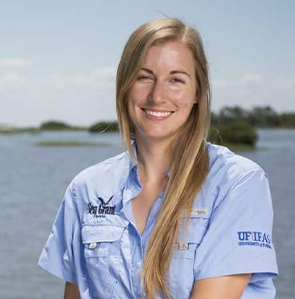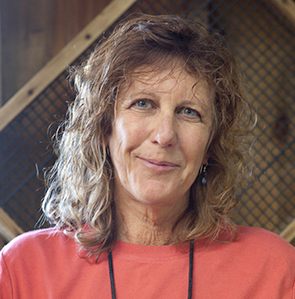DIVERSE PROGRAMS FOR A DIVERSE COMMUNITY
Extension is all about bringing research findings into the real world so we can improve our surroundings and how we interact with them. Our extension programs work to deploy science-based practices to make human interactions with the Nature Coast more sustainable in the long run so that this incredible region will thrive for a long time to come.
LIVING SHORELINES FOR THE GATOR GOOD
Play Video
NCBS EXTENSION PROGRAMS

The Coastal Ecosystems Extension program is led by Dr. Savanna Barry. She began serving the Nature Coast as a Regional Specialized Agent with Florida Sea Grant and UF/IFAS Extension in February 2016 and graduated with her doctorate in April 2016. She lives in Cedar Key and is stationed full-time at the Nature Coast Biological Station.

Leslie Sturmer leads our shellfish extension program with Florida Sea Grant. She provides extension support concerning aquaculture to the molluscan shellfish industry sectors in Florida. Audience groups include marine shellfish culturists, commercial shellfishers, state/federal marine resource regulators, shellfish dealers, and the interested general public.
COASTAL ECOSYSTEMS EXTENSION PROGRAMS
SUSTAINABLE COASTAL TOURISM & RECREATION
COASTAL RESILIENCE AND RESTORATION
VOLUNTEER
Nature Coast Currents Webinars
- This free webinar series documents research happening along Florida’s Nature Coast in an approachable way. Learn more and register for programs here.
Scalloping in the Nature Coast
- Find out how you can help protect bay scallops, one of our region’s most unique and important fisheries.
Be Seagrass Safe
- Learn more about seagrass communities, their countless ecosystem services, and how to protect them from physical damage.
- Seagrasses support almost everything we value about the Nature Coast, learn how you can support seagrass while boating.
Florida Friendly Fishing Guide
- Book a fishing trip with an eco-minded fishing guide or become a certified guide through this certification program.
Florida Friendly Angler
- Learn how you can up your game as an angler and protect Florida’s fishing future at the same time.
Big Bend Shellfish Trail
- Follow this culinary and educational trail to learn more about the shellfish fisheries and associated maritime heritage that make the Big Bend coast a special place.
Living shorelines
- Learn more about our efforts to improve shoreline management practices and how you can get started on your own living shoreline project.
Nature Coast Aquatic Preserve
- NCBS works with Florida DEP and other partners through a grant to collect water quality and seagrass data and engage stakeholders to assist with the goals of the management plan for the state’s newest Aquatic Preserve.
Climate Smart Floridians
- This training program gives Floridians the tools to help tackle climate change in their everyday lives.
Florida Master Naturalist Program Restoration series
- We offer the Coastal Shoreline Restoration and Marine Habitat Restoration courses. Check the FMNP website for current information on course offerings.
Get Involved
- Fill out a Volunteer Interest Form to receive information about getting involved with our projects.
Florida Horseshoe Crab Watch
- Volunteers with Florida Horseshoe Crab Watch survey beaches for nesting horseshoe crabs and tag a subset of them. Data are used by state and federal agencies in population studies.
International Coastal Cleanup
- Join us in Cedar Key annually on the third Saturday in September to help clean up our shorelines. Check our Facebook each September for more information.
Nature Coast Water Watch
- Water Watch volunteers in the Nature Coast are working to fill data gaps to help managers monitor coastal health along this rural stretch of coastline.
Habitat restoration
- When habitat restoration projects are active, we often need volunteers. Contact Savanna to add your email address to the interest list.
